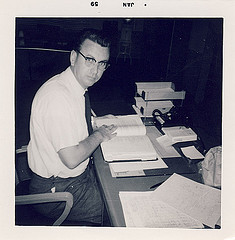 I recently got a question from MALW reader Dan Smith. He’s a cool guy (his URL used to be itsdansmith — great solution for someone with a common name!) living in the UK 300 miles from London, who’s built up a substantial freelance writing business on the side, while his full-time job is in business consulting. Here’s his story:
I recently got a question from MALW reader Dan Smith. He’s a cool guy (his URL used to be itsdansmith — great solution for someone with a common name!) living in the UK 300 miles from London, who’s built up a substantial freelance writing business on the side, while his full-time job is in business consulting. Here’s his story:
I’ve been a freelance writer for a few years now and I’m developing my career, so that the income I receive from writing can support my girlfriend and I comfortably, as well as in the future, any children we have.
Me and my girlfriend have been thinking about moving to London. We have family in the city and every time we visit we love it and don’t want to leave. The problem is that with the cost of living substantially higher in London (for example, our mortgage on a 2 bedroom house is just short of £400 a month – the 2 bedroom apartments we’re looking at in London are around £300 a week), I need to increase my income.
I think ideally I’d like to carry on freelancing. I’ve spent the past few years developing my career (although it has only been the last 8 months where I’ve really took a grip of it and pushed it forward) and it would seem a waste to slow this progression right down. However, doing a quick search on some job websites there’s a whole host of full time writing jobs available in London with salaries around the £30-35k mark (roughly $46-54k?), which would be a enough to live on, especially if my girlfriend got a job of around the same salary.
Yes, I could do what I do now and work during the day and freelance evenings, but the reason I’m moving to London is to enjoy the city. I’ll probably still do some freelance work, but I don’t really want to be working from 9am to 9pm.
I’m just looking for a bit of advice really, Carol. Should I develop my freelance writing career (I’d need to double my earnings) or should I take a full time writing role (and still freelance a little to supplement my income)?
Whew, lots of questions in there! But basically it boils down to: freelance, or full time? The answer depends a lot on your personality type and your ultimate goals for your writing career. On the freelance side:
Do you enjoy the hustle of finding clients, tracking down payments, the thrill of landing new accounts, the variety you get as a freelancer? The freedom to earn an unlimited amount and keep your own hours? Do you love working in your shorts?
Or do you hate networking, feel lonely in a home office, and feel nervous about finding enough work? Does the idea of getting out there and finding twice as many clients seem doable and exciting to you, or overwhelming? When you think about having kids around, would you like to be able to make your own schedule with them, or are you cool seeing them for dinner and on weekends while you work in town long days? Your gut reactions to these questions will give you some clues.
Also, could you maybe supplement your freelance writing with some freelance business consulting work like you do in your current full-time job? Maybe between the two you could have a full income from all freelancing?
On the full-time staff-writing side, my thoughts come from my experience having had two full-time staff gigs that lasted a total of 12 years.
First off, just because you see a bunch of full-time writer ads doesn’t mean you can get one of those jobs. Every employer I talk to who’s looking for full-timers tells me they get 200 resumes for every job. So odds are probably long on landing one of the gigs. Definitely secure a job before moving to London, rather than moving to London in hopes of lining one up! (And then your girlfriend also needs a good-paying a job in London, too, so there are a lot of ifs in that equation.)
A little insight on staff writing jobs: In my experience, they usually involve something like coming up with four story ideas, reporting them, writing them, and turning them in, each and every week, week after week, year after year. And all the articles are about one select beat. Or on the copywriting side, researching and completing a large volume of assignments each week for the company, about the same basic stuff.
I found over the years that there were a select group of people who could really hack it. Many came and went quickly, as they didn’t have that many story ideas, or lacked the work ethic and discipline needed to be that kind of reliable workhorse.
At one of my staff jobs, we were never fully staffed, and we even had one person go AWOL in the middle of a trade show the staff covered, who was never seen again. People with master’s degrees in journalism regularly threw in the towel.
Guess I’m trying to say: It can be a very intense grind…or you could love the challenge and the adrenaline of always having those deadlines looming. Your editor could be a screamer, or they could be an awesome mentor who’d take your writing to the next level. They could also be the type that thinks everybody should work 9 to 9. I had one editor who liked to begin ripping up the front page again around 6 pm and was never happier than when the whole staff stayed until 10. So a full-time writing job doesn’t necessarily mean you’ll have so much time to enjoy the city!
Finally, ask yourself which sounds more secure to you — locking in one full-time writing job at a set salary (which may rise over time gradually, but generally won’t shoot up skyward)…or having a diverse portfolio of freelance jobs, no one of which represents a majority of your income, which give you unlimited earning potential, but likely fluctuating monthly revenue?
For me, in this era of outsourcing, layoffs, and economic uncertainty, I think having one employer sounds scary. They have all the power over my life. They fire me and poof! I’m losing my apartment in London. They also only pay so much.
I may be biased toward freelance in part because I earn substantially more now as a freelancer than I did as a staffer — and I was a well-paid staffer. Maybe you’re the kind of hustler who’d have a better income freelance…or maybe a staff job would pay more bills. Depends on how much energy you’d be willing to put into marketing.
If you take a staff job, I’d think of it not as losing your freelance momentum, but of that freelance work having paved the way to that point where you could land a full-time job in your new field. It built the experience and clips you needed to move ahead to the next part of your career. And as you say, you can freelance on the side, or can pick up freelance writing again later in your career if you hit the point where you want out of the staff-writing life.
For every writer, there are stages to their career, and different situations may be right at different times. You can learn a heck of a lot as a staffer, and it can reliably pay a lot of bills if you find a great situation. It might solidify your transition into writing as a career.
I had one full-time stint that was so awesome, such a great learning experience, and so much outright fun, that when they handed me my pay envelope I’d always say, “All this and a paycheck too!” (Thanks Don & Rami!)
Ultimately, Dan, trust your gut about which is the right way for you to go — and best of luck getting to London! Stay in touch and let us know what you end up doing.
What’s your thinking on which road is best for you right now — full time or freelance? Leave a comment and let us know.
If you enjoyed this post, you can subscribe to Make a Living Writing to get free tips twice weekly on how to earn more from writing. You can also send me a question about your writing career, and if I think it’s of interest to my readers, I’ll answer it here on the MALW blog.
Photo via Flickr user foundphotoslj











